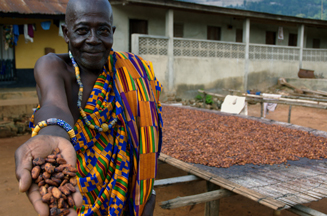
The Fairtrade movement's lingering associations with hippy lifestyles and dubious-tasting products looks set to be consigned to the history books following the news that Cadbury Dairy Milk has achieved Fairtrade Foundation-certification.
Under the deal announced last week, the UK's top-selling confectionery product, together with its hot-beverage division, will be awarded the certification by this summer, with the iconic flagship chocolate bar to carry the mark front-of-pack. When it makes the switch, the UK value of Fairtrade-certified chocolate will rocket to £225m. Cadbury chief executive Todd Stitzer said the company intends to convert its other brands as soon as possible.
The Fairtrade-certified sector is already worth £500m in the UK, with supermarkets and specialist brands such as Caf沤direct and Divine Chocolate leading the way. Yet Cadbury's entrance into the market will have far-reaching ramifications.
Not that other major chocolate competitors have been oblivious to the CSR side of cocoa production: a spokesman for Mars points out it has been investing in cocoa sustainability for 30 years, while Nestle joined the UTZ Certified Good Inside Cocoa Programme in February 2008, which aims to work toward sustainability in mainstream cocoa production.
Yet, no matter how laudable their achievements to date, Cadbury's switch will be sending ripples through rivals' CSR and marketing departments, which will undoubtedly be expected to respond. While Cadbury has naturally played up the altruistic side of the plan - it will cost the company £1.5m but it raised prices last year to absorb this cost - the business advantage is a powerful one.
Giles Gibbons, chief executive of CSR consultancy Good Business, speculates that major competitors may respond by finding other worthy ways to differentiate themselves. 'Cadbury will gain huge benefit from being the first,' he says. He warns that the second company to switch will be hit by a similar cost but will not benefit from a similar 'reputation uplift'.
Gibbons argues the move can have only a positive effect on the Cadbury brand, and will not confuse or alienate the legions of Dairy Milk fans. 'Our research tells us that when consumers buy a product, they want to feel that they are not the only ones benefiting from that purchase,' he says.
So what does this decision mean for the Fairtrade pioneers? Caf沤direct, the hot-drinks company which was the first to roll out Fairtrade Foundation-certified coffee in the UK, has just appointed Albion to create a campaign. One source said the brief centred on finding a message that would ward off the supermarkets, which have stolen a march on Fairtrade tea and coffee through own-label brands. Caf沤direct's 2008 annual report reveals that trading conditions in the retail sector were 'challenging', and revenues fell by 5% year on year to £16.2m.
Divine, a Fairtrade Foundation-certified chocolate company, is putting on a brave face despite facing the loss of the brand's USP. 'It presents a huge challenge for us, but it's one we welcome,' says head of communications Charlotte Borger. She insists that Divine had set itself a target to get Cadbury to convert, as getting Fairtrade certification into the mainstream was one of the company's founding principles.
A glance at bloggers with an ethical focus reveals concern for the future health of Divine, but Borger says Cadbury has pledged not to drive others out of the market through its powerful relationships with retailers, and that her brand will hold firm. 'We have a different positioning; we are a better-quality chocolate and have a loyal following,' she says. 'There are still many things that we can say about our brand that [Cadbury] can't say.'
Assuming that Cadbury sticks to the Fairtrade-certification criteria, even those cynical about brands' CSR efforts may find it hard to argue against it. Yet, by raising the bar, Cadbury has not only thrown down the gauntlet to rivals but has opened itself up to intense scrutiny.


